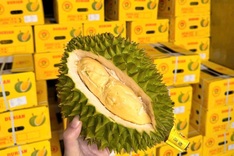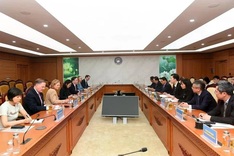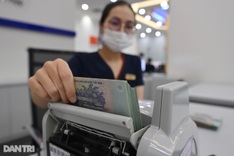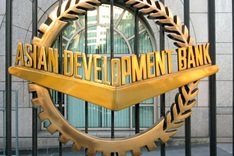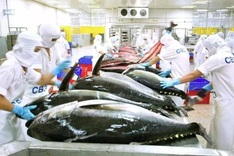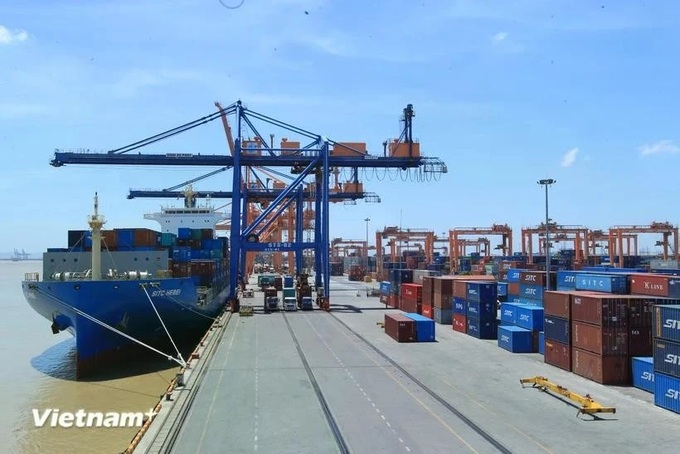
Illustrative image (Photo: VNA)
In response to the complicated developments in the global market, the Ministry of Industry and Trade (MoIT) has proactively developed scenarios and strategies to handle the escalation of global trade tensions.
According to the ministry, three distinct trends are emerging in global trade: de-globalisation or fragmentation in international trade, which is leading to the resurgence of tariff tools; protection of markets through technical measures, trade barriers, or trade defence; and unpredictable policy actions, causing disruptions and even breakdowns in supply and production chains.
Vietnam's key export markets are increasingly focusing on issues such as sustainable development, climate change response, and consumer safety. On the other hand, importers are gradually implementing new, stricter standards and regulations related to supply chains, raw materials, labour, and the environment for imported products.
In early February 2025, US President Donald Trump activated the International Emergency Economic Powers Act (IEEPA), citing the need to address the issue of illegal immigration and the illegal trafficking of narcotics into the US. This action provided the legal basis for imposing additional tariffs of 25% on goods imported from Canada and Mexico, and 10% on imports from China.
Subsequently, Canada and Mexico engaged in negotiations with the US and were temporarily exempted from the import tariff for 30 days. However, the tariff rates and their duration remained unchanged for China, leading to China’s retaliatory imposition of tariffs and restrictions on the export of several key minerals to the US.
Amidst the complicated developments in the global market, the MoIT has directed foreign market departments and Vietnam’s trade offices abroad to closely monitor market trends, as well as economic, political, and policy changes in the region and the world that could impact trade with Vietnam.
The ministry emphasised that the industry and trade sector remains committed to a strategy of diversifying export and import markets, as well as product and commodity categories. At the same time, it considers science and technology as a driving force to enhance the value-added content and technological capacity of products produced and processed in Vietnam. Specifically, it aims to capitalise on Vietnam's existing advantages to gradually strengthen the country’s role and position in the global supply chain and international markets.
In the coming period, the MoIT plans to focus on measures aimed at minimising risks and boosting exports. They include supporting businesses and industry associations in making the most of competitive advantages, and taking full advantage of 17 free trade agreements (FTAs) and nearly 70 existing bilateral cooperation mechanisms to effectively tap into key and traditional markets, develop small and niche markets, and explore new potential ones.
In particular, the ministry will continue to implement a strategy for diversifying export markets toward promising markets, through conducting research, disseminating market information and opportunities to businesses, proposing negotiations for new FTAs with high-potential markets, strengthening trade promotion activities, and increasing exports to these markets.
The sector will continue to capitalise on the global supply chain shift and Vietnam's advantages to attract foreign investment, particularly from developed industrial nations, in high-tech sectors and key supporting industries. It will also strengthen the monitoring of new investment project licenses and strictly screen foreign investment to prevent Vietnam from becoming a transit point or being exploited for third-country origin labeling.
Regarding the US market, the MoIT said that the economic and trade relations between the two countries are complementary. The export structures and foreign trade of both nations do not directly compete but rather complement each other, aligning with the internal needs of each country.
Vietnamese goods exported to the US mainly compete with products from third countries, not directly with those of US businesses. On the contrary, this creates an opportunity for US consumers to access and use Vietnamese products.
According to the ministry, in the coming period, the economic and trade pillars will continue to develop steadily within the overall framework of the Vietnam - US Comprehensive Strategic Partnership. Any existing issues in bilateral economic and trade relations, if any, will be proactively addressed through the policy dialogue mechanism of the Vietnam - US Trade and Investment Framework Agreement (TIFA). This aims to strengthen strategic trust between the two countries and create a shared vision that contributes to long-term guidance and a stable roadmap for the development of bilateral economic and trade relations./.


